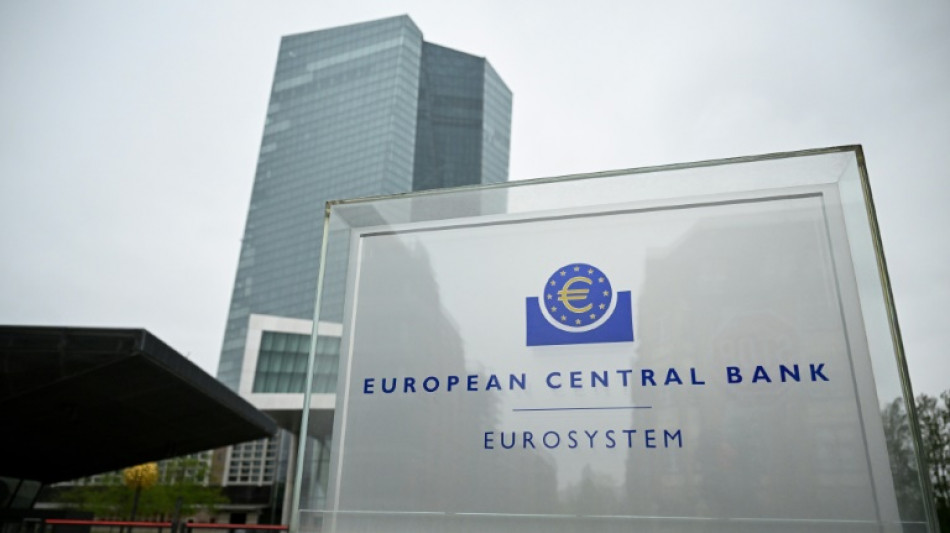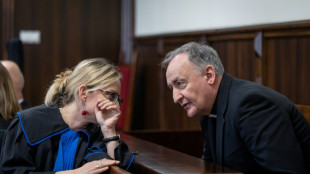
ECB cuts rates again but pause seen ahead

President Christine Lagarde said the European Central Bank was in a "good place" to deal with global uncertainty as it cut interest rates again Thursday, fuelling expectations it might soon hit pause after a lengthy easing cycle.
The ECB cut its key deposit rate a quarter point to two percent, as widely expected, its seventh consecutive reduction and eighth since June last year when it began lowering borrowing costs.
It also lowered its inflation forecast, with the indicator now expected to hit the central bank's two-percent target this year, as US President Donald Trump's tariff blitz exerts downward pressure on prices.
As inflation has stabilised following a post-pandemic surge, the ECB has shifted its focus to dialling back borrowing costs to relieve pressure on the 20 countries that use the euro.
Trump's tariffs have added to the uncertain outlook, with Europe firmly in his crosshairs, fuelling fears about a heavy hit to the continent's exporters.
But Lagarde struck a measured tone. While the US trade war was causing problems, she noted signs of growing strength in the eurozone economy as well as a potential future boost from plans for greater infrastructure and defence spending.
She refused to comment directly about whether the ECB would pause its cuts at its next meeting in July, as some expect, but she stressed repeatedly that the central bank was in a "good place".
"We are in a good position to navigate the uncertain conditions that will be coming up," she said.
"I think we are getting to the end of a monetary policy cycle," she added.
The ECB left its growth forecast for 2025 unchanged at 0.9 percent, and also noted inflation was now around its two-percent target -- dropping previous language that it was "on track". Eurozone inflation came in at 1.9 percent in May.
- 'Summer pause' -
ING bank analyst Carsten Brzeski said Lagarde's comments signalled a "summer pause" to its rate cuts.
"It will take a bit longer to understand whether the current disinflationary risks are merely one-offs or whether they signal a broader trend," he said.
But he added he expected one more cut from the central bank this year, likely in September.
The ECB's series of cuts stands in contrast to the US Federal Reserve, which has kept rates on hold recently amid fears that Trump's levies could stoke inflation in the world's top economy.
Lagarde also knocked back suggestions she could cut her term short following reports she had discussed taking the helm of the World Economic Forum.
"I have always been and I'm fully determined to deliver on my mission and I'm determined to complete my term," she said.
- Trump tariffs blitz -
Trump, who argues his tariffs will bring manufacturing jobs back to the United States, has already hit the EU with multiple waves of levies.
The bloc currently faces a 10-percent "baseline" tariff as well as higher duties on specific sectors.
He has paused even higher rates on the EU and other trading partners to allow for talks, but he continues to launch fresh salvos that are keeping the world on edge.
This week he doubled tariffs on aluminium and steel from 25 to 50 percent and last month threatened the EU with an escalation if it did not negotiate a swift deal.
Trump's tariffs are expected to exert downward pressure on eurozone consumer prices, and Lagarde conceded the inflation outlook was "more uncertain than usual".
This is due to factors including tariff-hit China redirecting inexpensive manufactured goods to Europe, recent strengthening of the euro and potentially lower energy prices.
Lower inflation and still tepid growth should push the ECB to make further rate cuts.
There are some factors that make this uncertain though.
These include signs of resilience in the eurozone economy at the start of the year and a potentially inflationary spending blitz planned by the new German government.
N.Hong--SG

 London
London

 Manchester
Manchester
 Glasgow
Glasgow
 Dublin
Dublin
 Belfast
Belfast
 Washington
Washington
 Denver
Denver
 Atlanta
Atlanta
 Dallas
Dallas
 Houston Texas
Houston Texas
 New Orleans
New Orleans
 El Paso
El Paso
 Phoenix
Phoenix
 Los Angeles
Los Angeles

